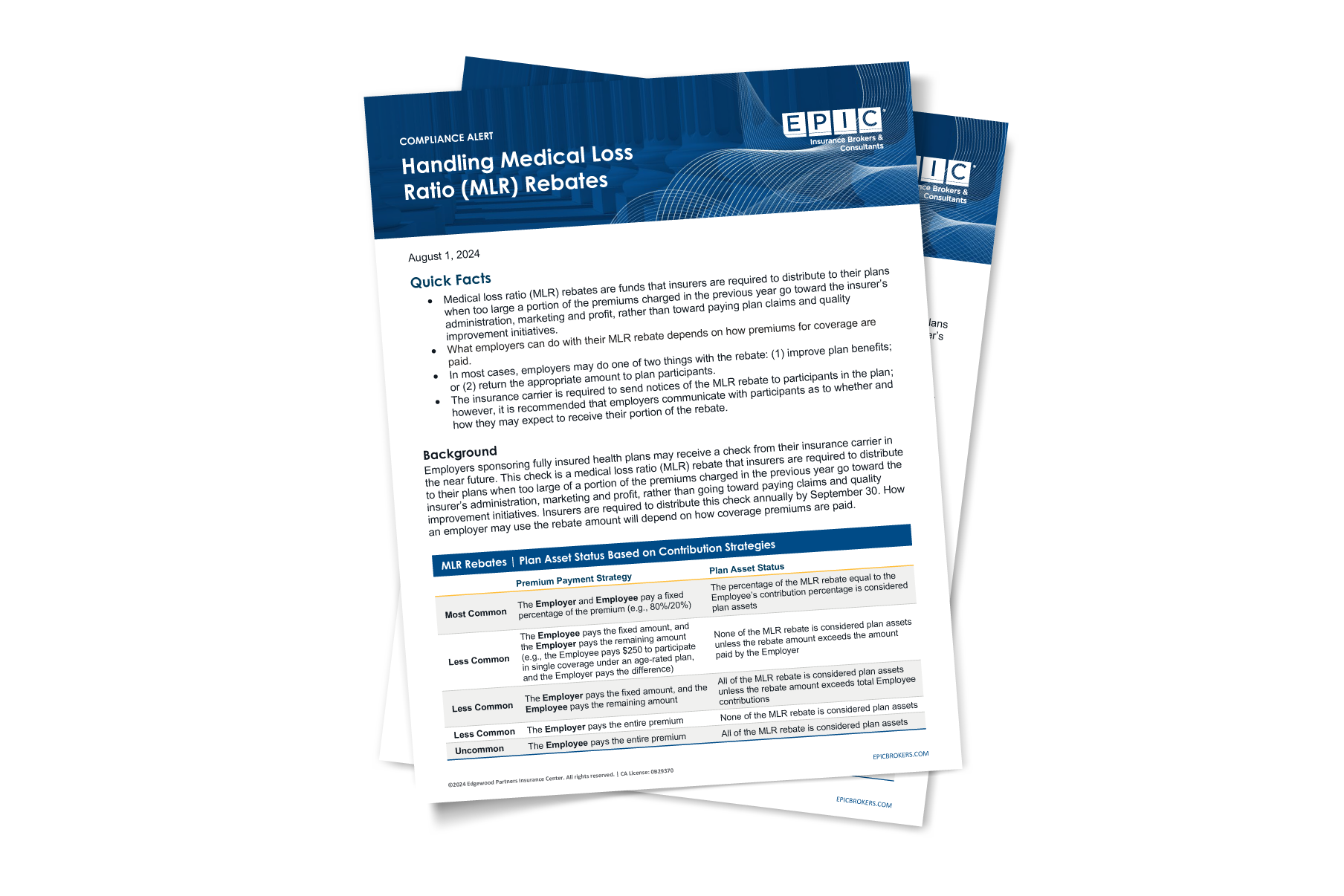Let our team help you navigate the ever-changing benefits compliance landscape each month. Check out this month’s latest alerts, additional updates, and resources hot off the press:
Employee Benefits Compliance Alerts
This month’s Compliance Matters newsletter provides a comprehensive review of the following topics. To obtain your copy, please use the form below to download.

- Affordable Care Act Employer Reporting Refresher
- CMS Medicare Part D Disclosure Due Soon for Calendar Year Plans
- W-2 Cost of Coverage Reporting Refresher
- Employee Benefits Litigation Series: Sixth Circuit Examines Mental & Physical Disability Overlap
Download this month’s alerts
Additional Updates & Resources
Recent Legislation Reforms ACA Employer Reporting
The Affordable Care Act (ACA) requires employers and health insurance providers that provide minimum essential coverage to report this information for each covered individual to the Internal Revenue Service (IRS) and provide a copy of the 1095-B or 1095-C tax form to the covered individual by March 2 of each year. Recently, Congress passed, and the President signed into law, two bills that modify provisions under the ACA.
The Paperwork Burden Reduction Act (HR 3797) modifies provisions under the ACA so that employers and health insurance providers are no longer required to send 1095-B and 1095-C tax forms to covered individuals unless a paper form is requested.
Applicable large employers who wish to provide paper tax forms only upon request must give notice to all individuals that they can request a copy of the form, in the manner and timeframe specified by the Secretary of the Treasury Department.
The Employer Reporting Improvement Act was introduced on June 5, 2023, and passed in the House on June 21, 2023. It passed the Senate on December 11, 2024. Most provisions are effective for returns that are due after December 31, 2024. Under the Employer Reporting Improvement Act, for information returns due in 2025 for the 2024 calendar year, the legislation will:
- Allow employers to substitute an individual’s full name and date of birth in place of a taxpayer identification number (TIN) if they are unable to collect information on the TINs of such individuals. Existing Treasury regulations permitted this substitution. This new bill makes it law.
- Allow employers to deliver reports electronically to employees who have previously given consent at any prior time to receive the statement in electronic form.
- Establish a six-year statute of limitations for collecting assessments. This is effective for assessments proposed in taxable years beginning after the date of enactment of this Act.
The legislation will give certain large employers at least 90 days, instead of the current 30 days, to respond to the first letter from the Treasury Department outlining a proposed shared employer responsibility payment, beginning in the taxable year after the date of the bill’s enactment. Because the law was signed in December 2024, it begins for the 2024 tax year.
Stop-Gap Bill Does Not Contain Employee Benefits Changes
On Saturday, December 21, 2024, President Biden signed into law HR 10545, the American Relief Act, 2025, a year-end appropriations bill that avoided a government shutdown and funds the government through March 14, 2025.
Other versions of a year-end spending bill that did not pass contained employee-benefits-related provisions, including an extension of relief for high deductible health plans (HDHPs) that offer telehealth at low or no cost, and pharmacy benefit manager (PBM) reform. HR 10545 does contain some temporary relief for Medicare telehealth flexibilities until March 31, 2025. It is possible that Congress may pass these changes in another bill or reintroduce them in the next Congressional session.
Hospital Indemnity Notice Requirement Struck Down
In final rules issued by the Department of Labor (DOL), the Department of Health and Human Services (HHS) and the Internal Revenue Service (IRS) this past summer, beginning in 2025, hospital indemnity and other fixed indemnity plans were required to include a new notice in any application, enrollment and marketing materials. This notice requirement was challenged by several insurance companies as not being authorized by law, and on December 4, a district court judge agreed with those companies and struck down the new notice requirement. While the government could still appeal this ruling, it seems unlikely they will do so given the incoming Trump administration. And even if they did, the new administration could halt the appeal. So, for now, the notice requirement is not enforceable.
PCORI Fee Updated for 2025
On December 2, 2024, the Internal Revenue Service (IRS) issued Notice 2024-83, providing the adjusted Patient-Centered Outcomes Research Institute (PCORI) fees for plan years ending in October 2024 through September 2025. Employers who sponsor self-funded medical plans, or a self-funded component of a fully insured plan, are required to report and pay the Affordable Care Act (ACA) PCORI fees no later than July 31, 2025. The fees are used to fund the PCORI Trust Fund which helps patients, clinicians, purchasers, and policymakers make better-informed healthcare choices by advancing clinical effectiveness research.
Payment amounts due in 2025 will differ based on the employer’s plan year. The fees due on July 31, 2025, are as follows:
- $3.22 per covered life for plan years ending October 2023 – September 2024
- $3.47 per covered life for plan years ending October 2024 – September 2025
The IRS put together a chart showing applicable fee amounts depending on the plan year end date; however, as of the date of this publication, the chart has not been updated to include the applicable rates for filings due in 2025. Plan sponsors should use the Form 720 to file and pay the PCORI fee. The Form 720 is updated annually in the spring to reflect the updated PCORI fee.
2024 Form 5500s Released with Minimal Updates
Through a news release published on November 25, 2024, the Departments issued copies of the 2024 Form 5500 series, including Form 5500, Form 5500-SF, Form 5500-EZ, and instructions. The updates to the Forms are minimal and mainly related to retirement plans.
Form 5500s are required annually and are due at the end of the seventh month following the end of the plan year, which is July 31 for calendar year plans. For more information on Form 5500s, you can access our previous Alert. The Department of Labor (DOL) has a website dedicated to the Form 5500 filing.
New Requirement | Florida PBM Attestations
In May 2023, Florida Governor Ron DeSantis signed the Florida Prescription Drug Reform Act into law. For more details on the Act, review our March 2024 Compliance Alert. Amongst other things, the Act has specific requirements for contract provisions within agreements between pharmacy benefit managers (PBM) and self-funded plan sponsors executed or renewed on or after July 1, 2023, with benefits in effect after January 1, 2024. Plan sponsors must attest that their PBM agreements are in compliance with these contract requirements. Self-funded plan sponsors may attest using a sample attestation and instructions available on the Florida Office of Insurance Regulation (Florida OIR) website. Florida OIR provides a sample attestation and instructs plan sponsors to send the attestation to .
San Francisco Announces Updates to HCAO Minimum Plan Design Standards
The Health Care Accountability Ordinance (HCAO) applies to most City contractors and tenants (including those at the San Francisco International Airport and the Port of San Francisco). The HCAO requires employers to offer a compliant health plan to their covered employees, to make payments to the City for use by the Department of Public Health or, in specific circumstances, to make payments directly to their covered employees. To comply with the HCAO by providing a compliant health plan, a plan sponsor must provide a plan that meets all HCAO requirements. Effective January 1, 2025, an HCAO compliant plan must provide:
- Coverage of annual out-of-pocket expenses for in-network services is 50% of the plan’s annual out-of-pocket maximum covered on a first-dollar basis.
- In-network out-of-pocket maximum of $9,200 (up from $8,750).
- Maximum allowable coinsurance rate of 55%/45% for in-network services.
- Prescription Drug Deductible of $400.
- Maximum allowable copayment for in-network primary care provider visits increases to $65 per visit.
- Meet all the requirements of the California benchmark plan listed here.
FAQ of the Month
What are the election change rules for Dependent Care Assistance Programs (DCAPs)?
The DCAP election change rules are a little more flexible than Section 125 election change rules for group health plans. The permitted election change events that apply to DCAPs fall into the following broad categories:
- Change in status: For DCAP purposes, various changes in status may affect eligibility of dependent care expenses.
- Change in cost and coverage: Under these rules, certain changes in cost and coverage of the DCAP will justify a midyear change in election. For example, when there is a change in the cost of a dependent care provider, or when a participant changes dependent care providers, a plan usually can permit a midyear change in election.
- FMLA: Employees who take Family Medical Leave Act (FMLA) leave are entitled to revoke elections of non-health benefits (such as a DCAP) under a cafeteria plan to the same extent as employees taking non-FMLA leave. Note that certain reinstatement rules apply on return from FMLA leave.

More Compliance Resources
- Sign up for our in-depth 2024 Compliance Webinars
- Learn about our Compliance Consulting Services

WANT TO GET COMPLIANCE MATTERS IN YOUR INBOX?
Sign up for the monthly newsletter.
